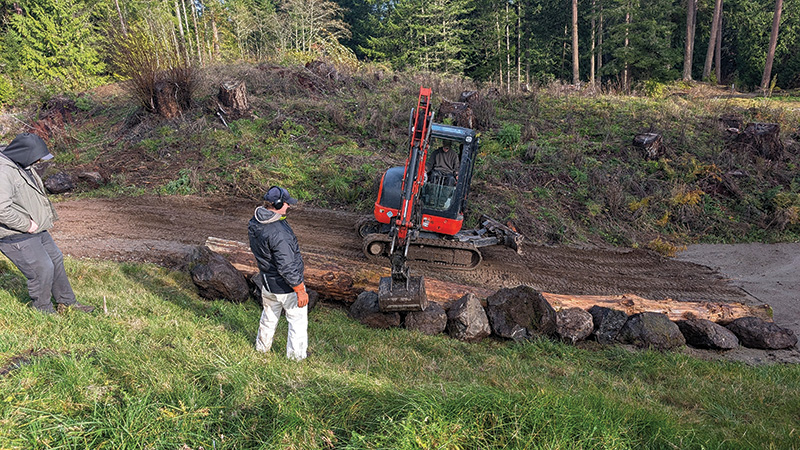
Crew members at Port Ludlow (Wash.) Golf Course work on a walking path to a newly renovated bunker practice green. Photos courtesy of Shawn Vetterick
As golf course superintendents, we often struggle with high employee turnover. We invest time, money and effort into training new employees, only to see them leave for another course that offers higher pay. How can we prevent this from happening so frequently?
Many assume that increasing wages is the answer. However, I firmly believe that if a workplace is toxic, no amount of money will keep employees from seeking something better. Instead of just offering higher pay, how can we make our course the “something better” that employees want to stay with?
With more than 20 years in the turf industry — ranging from a crew member to superintendent, as well as experience in lawn care — I have worked under excellent and poor leadership across Iowa, Missouri and Washington state. Here, I’ll share what has worked for me in keeping employees engaged and committed to their jobs.
Creating a positive work environment
While higher pay may attract applicants, a good work environment keeps employees. A person may love their job but leave due to a poor relationship with their boss. I’ve learned that fostering a positive work culture leads to happier, more motivated employees who are more likely to stay.
During the hiring process, I am upfront and honest with candidates. I emphasize the importance of honesty, communication and mutual respect. I make it clear that I expect transparency from my employees, just as they can expect it from me.
When an employee tells me they need a mental health day, my first priority is their well-being. If they don’t have paid time off, they can still take the day unpaid. This approach demonstrates compassion, flexibility and understanding — essential factors in employee satisfaction.
Giving employees ownership and recognition
A superintendent is only as good as their crew. That’s why I always acknowledge my team’s efforts. When a job is well done, I make sure the board of directors, green committee or course members know who was responsible.
Simple gestures, such as telling members to personally thank a crew member, go a long way in boosting morale.
Additionally, small rewards, such as bringing in doughnuts or hosting a BBQ, can create a sense of camaraderie. When employees feel valued, they take pride in their work, which leads to higher quality performance.

A drone caught this photo of assistant Colin Butler rolling the green on Port Ludlow Golf Course’s No. 6 hole.
Building relationships and trust
Getting to know your employees personally helps in spotting potential issues before they escalate. An open-door policy allows employees to come forward with concerns rather than letting frustrations build up.
I also work alongside my crew, which fosters mutual respect. Through this, they learn about me beyond my title — I share my journey as a recovering alcoholic, my faith and my family life. In return, they feel comfortable opening up to me. This connection builds trust, loyalty and a sense of team spirit.
Recently, I had to fire an employee who was consistently late. Despite multiple warnings, he showed up on time only twice in two months. When he was let go, he tried to complain to the rest of the team, but they defended the decision, knowing that I had been fair. This level of team support only comes when employees know their leader has their backs.
Managing employee performance effectively
Allowing a bad employee to remain unchecked can negatively impact the entire crew. If hardworking employees see that poor performance is tolerated, it can lead to resentment and disengagement.
On the flip side, a marginal employee can improve if surrounded by a strong team that holds them accountable. I ensure my crew understands why we do things a certain way rather than just giving orders. I also seek their input, making them feel invested in decisions. This approach leads to greater job satisfaction and engagement.
Leadership beyond the turf
Success in this industry isn’t just about managing grass, bunkers and trees — it’s about managing people. The greatest measure of my success is seeing former crew members advance to assistant superintendent or superintendent roles.
By giving credit where it’s due, fostering a team-oriented atmosphere and maintaining honesty, I’ve learned that employees respond positively. I don’t see my job as just work. I get to go to a golf course every day. When employees feel the same way, retention takes care of itself.
Shawn Vetterick has been the GCSAA Class A superintendent at Port Ludlow Golf Club in Port Ludlow, Wash., for three years. A 10-year GCSAA member, he has been in the turf business for over 25 years and has worked on golf courses in three states over the past 10 years.